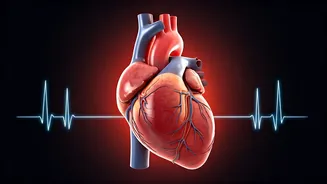What Is Heart Failure?
Heart failure signifies the heart's inability to pump blood efficiently, failing to meet the body's demands. This condition is not about the heart stopping
but rather struggling to function correctly. This can arise from numerous causes, including coronary artery disease, high blood pressure, and heart valve problems. The impact of heart failure varies, potentially affecting daily activities and overall quality of life. The severity differs from individual to individual, but it necessitates careful medical supervision, lifestyle modifications, and, in certain instances, advanced treatments to control the condition and enhance the patient's well-being. Understanding this condition is the first step toward effective management and a healthier future.
Recognizing Early Signs
Identifying early symptoms is crucial in managing heart failure. Key indicators include persistent fatigue, even after rest. Shortness of breath, especially during exertion or when lying down, is another common sign. Swelling in the ankles, legs, or abdomen, often referred to as edema, can also indicate heart failure. Additionally, some people experience rapid or irregular heartbeats. Other symptoms can include unexplained weight gain due to fluid retention and reduced appetite, as well as difficulty concentrating. Early detection is crucial because the disease's progression can be slowed with appropriate medical intervention, including medications, lifestyle changes, and, in severe situations, surgical procedures. Individuals who experience multiple symptoms should promptly seek medical assistance.
Prevention Strategies Explored
Several preventative measures can drastically reduce the risk of heart failure. Adopting a heart-healthy diet is fundamental, encompassing the consumption of fruits, vegetables, whole grains, and lean proteins, while limiting saturated and trans fats, cholesterol, and sodium. Regular exercise is essential, with a recommendation of at least 150 minutes of moderate-intensity or 75 minutes of vigorous-intensity aerobic exercise per week. Regular monitoring of blood pressure and cholesterol levels, as well as managing conditions such as diabetes and high blood pressure, helps in preventing heart damage. Additionally, it is advised to avoid smoking, limit alcohol consumption, and control stress levels through relaxation techniques such as yoga or meditation. These strategies, combined with regular medical check-ups, can significantly promote heart health and reduce the risk of heart failure.
Importance of Early Detection
Early detection plays a crucial role in the effective management of heart failure. When diagnosed early, doctors can initiate treatment and preventive measures promptly, potentially slowing the disease's progression and mitigating its impact on daily life. Early intervention can involve medications, lifestyle changes, and in certain cases, surgical procedures to manage the symptoms and improve the patient's quality of life. Regular check-ups and health screenings are paramount for timely detection, especially for individuals with risk factors, such as a family history of heart disease, high blood pressure, or diabetes. It is essential for individuals to consult with healthcare professionals if they experience any signs of heart failure or have concerns about their heart health to get a prompt diagnosis and receive the care they require.
Treatment Options Explained
Treatment options for heart failure vary based on the severity of the condition and the patient's individual needs. Medications commonly prescribed include ACE inhibitors, beta-blockers, and diuretics, which aid in controlling blood pressure, reducing the heart's workload, and managing fluid retention. In certain cases, devices such as pacemakers or implantable cardioverter-defibrillators (ICDs) may be necessary to regulate heart rhythm. Lifestyle adjustments, like dietary modifications, including reducing sodium intake, and regular exercise, form an integral part of the treatment plan. Advanced treatments, such as heart transplantation or ventricular assist devices (VADs), are available for patients with severe heart failure. The primary aim of these treatments is to relieve symptoms, improve heart function, and enhance the overall quality of life for individuals living with heart failure.














